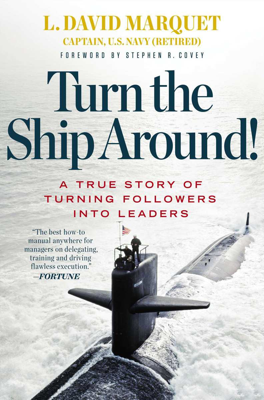“We Learn”
Realization on Competence and Control
David Marquet reflects on a critical insight gained from recent challenges on the USS Santa Fe: the interdependence of control and competence. As authority is delegated, the demand for technical knowledge intensifies at all levels, ensuring that decision-making is well-informed and effective.
Incident Analysis and Support from Leadership
An error in the torpedo room led Marquet to reconsider his approach. Despite the initial intent to empower the crew, a lack of technical understanding resulted in operational mistakes. Support from Commodore Mark Kenny reassured Marquet, emphasizing the expectation that challenges would precede improvement and encouraged perseverance in the face of setbacks.
The Importance of "We Learn"
The discussion with officers and chiefs led to the crystallization of a core philosophy: "We Learn." This concept encapsulates an everyday practice aimed at maximizing learning opportunities: - Passive vs. Active Learning: The preference for the term 'learning' over 'training' is underscored, highlighting learning as an active, self-driven process. - Daily Application: Every task, whether maintenance, drills, or daily operations, is viewed as a learning opportunity, reinforcing the importance of continuous personal and professional growth.
Codifying Learning into a Creed
The Santa Fe crew developed a creed to capture their commitment to learning: - Learning Objectives: They focus not only on procedural training but on understanding the broader implications of their duties including readiness for combat and defense of constitutional values. - Operational Philosophy: Framing daily tasks as learning opportunities transforms routine activities into chances for enhancement and ownership.
Strategic Implementation and Training Program Impact
Marquet ties the philosophy of learning to practical applications: - Training as Enabler: Training sessions are no longer just administrative necessities but pivotal in increasing competence. Enhanced competence facilitates more informed and decentralized decision-making across the crew. - Broader Engagement and Ownership: A well-implemented learning approach increases crew engagement, initiative, and overall productivity.
Proposed Activities for Encouraging Learning
Marquet suggests interactive activities to integrate learning more deeply into organizational culture: - Interactive Sessions: Using cards to annotate and discuss management decisions encourages participation and identifies areas for improvement in organizational competence. - Direct Connection of Training to Empowerment: Training is linked directly to increased decision-making authority, fostering a deeper investment in personal and organizational development.
Reflective Questions
Marquet concludes with questions to guide leaders in assessing and enhancing the learning culture within their organizations: - Consider whether lack of technical competence at lower levels is leading to mistakes and inefficiencies. - Explore the potential of a "we learn" policy for both junior and senior team members. - Consider developing a creed that encapsulates the organization's values and objectives, similar to the Santa Fe's creed.
Through these reflections and strategies, Marquet emphasizes the transformative power of continuous learning and competence development in achieving effective leadership and operational excellence.
